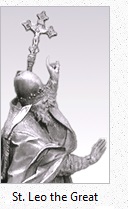|
|
|

It seems
to many of my rather wealthy friends, that . . . when a baptized person
sins—any sin—that sin is only concupiscence. . . . [and that
if] we are called sons and daughters of God as a fact, and not as an honorary
title, how can God send his very own children to hell to suffer unspeakable
tortures for ever and ever and ever? . . . I am in a state of great upsettness
about this. If we are not protected from the type of sin that sends one to
hell forever, and ever, then does that not strongly imply that hell, and
all its eternal torments, is full of millions upon millions of God’s
very own children, children He loves just as much as Jesus Christ. . . .
If we baptized are born again as true children of God, and as sisters and
brothers of Jesus Christ, how can we make ourselves believe that God would
find it necessary to do such a thing?
 e can believe it easy enough because
it is true. Many baptized have been lost to hell,
and many baptized will be lost in times to come. e can believe it easy enough because
it is true. Many baptized have been lost to hell,
and many baptized will be lost in times to come.
What is
Baptism?
Now, in order to understand this,
we need to be clear about what baptism really means. For one thing, it’s
not a magical act that once performed has
independently irrevocable effects. It’s not just a sort of bath
either—or, in the words of Saint Peter, “It is not a removal of
dirt from the body” (1 Peter 3:21b). Nor is it a license to commit sin
with impunity.
So, what is
baptism?
Well, as Saint Peter explains,
baptism is “an appeal to God for a clear conscience, through the
resurrection of Jesus Christ who has gone into Heaven and is at the right
hand of God, with Angels, Authorities, and Powers subject to Him”
(1 Peter 3:21b-22). That is, baptism signifies our yearning for holiness,
a holiness that is made possible by Christ’s resurrection—which
conquered our slavery to death and sin—and its promise is
guaranteed by the absolute power of Christ over all things.
In baptism, then, we proclaim
our intention to accept Christ’s great gift of chaste purity of heart.
Thus, in our baptismal vows we promise to
renounce Satan, to turn away from evil and
sin, and to order our lives in
chastity. And once we accept that gift we must
reaffirm it with every heartbeat, beat after beat, right
to the end.
The one who
perseveres to the end will be saved. |
—Matthew
24:13 |
But if we
“undo” our baptismal vows and fail
in our mission, well, then, just be warned: no sexual “partner,”
no sports team, and no celebrities will be able to protect us, and no drugs, no
tobacco, no alcohol, and no food will comfort us, when, at our judgment after death,
the glaring light of divine truth illuminates the abhorrent unholiness of our
behavior and we sink down, forever separated from God, into doom.
Seduction by
the World
Sadly, many do not
persevere to the end because they become
seduced by the unholy
world around them. Caught up in the self
and deceived by spiritual blindness, they
slowly accept the ways of a corrupt world as the status quo. And
finally, when the Seven Deadly Sins have become
just a way of life, their baptismal promises, hanging
from them in tatters, will be no protection in a culture of insanity. Why?
If we persevere,
we will reign with Him. But if we deny Him, He will deny us. |
—2 Timothy
2:12 |
We deny Him by being unwilling
to love—and the most undeniable testimony to
our being unwilling to love is our unwillingness to guard ourselves against
sin after our baptism. That is, those who cease to affirm their baptismal
promises and turn away from them, turn away from Christ Himself. And when
they deny Him, all that heavenly power that Saint Peter described will be
turned against them, and they will have no choice but to throw themselves
into hell to flee from it.
God doesn’t do it to us,
we do it to ourselves.
|
 Christian, remember your
dignity, and now that you share in God’s own nature, do not return by
sin to your former base condition. Bear in mind who is your head and of whose
body you are a member. Do not forget that you have been rescued from the
power of darkness and brought into the light of God’s kingdom. Christian, remember your
dignity, and now that you share in God’s own nature, do not return by
sin to your former base condition. Bear in mind who is your head and of whose
body you are a member. Do not forget that you have been rescued from the
power of darkness and brought into the light of God’s kingdom.
Through the sacrament of baptism you have become a temple of the Holy Spirit.
Do not drive away so great a guest by evil conduct and become again a slave
to the devil, for your liberty was bought by the blood of Christ. |
|
|
—From a sermon by Saint Leo
the Great, pope
Office of Readings, December 25 |
|
Pride
So why should so many of
Christ’s own anointed stumble back into the power of darkness? The answer
is simple: pride—the most subversive of all
the sins.
Because of pride, bishops will
forsake the good of their flocks to seek their own prestige. Because of pride,
priests will forsake the power of the Eucharist to seek their own power over
others. Because of pride, religious will forsake the identity of Christ
crucified to seek the identity of a religious habit. Because of pride,
lay persons will forsake the call to deny themselves and will seek to display
their holiness before others through external
acts that never cut deep into the heart.
Because of pride, Christ is betrayed,
truth is persecuted, and darkness creeps back into the house from which it
once was cast out.
|
Now we must surely
know that even when the contest is for a wreath that lasts but a day, if anyone
is found to be breaking the rules, he is flogged and driven off the racecourse.
What do you suppose, then, will be the fate of those who break the rules in
the contest of the Christian life? Of those who have not kept the seal of their
baptism unbroken, Scripture says: The worm does not die and the fire is never
extinguished. They will be a spectacle to all men.
We should repent of our sins while we are still on earth. When
a potter is making a vessel and it becomes misshapen or breaks in his hands, he
shapes it again; but once placed in the oven, it is beyond repair. Now the clay
in the craftsman’s hands is an image of ourselves, and it teaches us that, while
still in this world, we must wholeheartedly repent of sins committed in the body
and make it possible for the Lord to save us while there is time. When we have
left this world, we shall no longer be able to repent and confess our sins. We must
do the will of the Father, keep our bodies pure, and observe the commandments of
the Lord, for this is the way to obtain eternal life. The Lord says in the gospel:
If you have not been observant in small matters, who will entrust you with
anything important? For I tell you that the man who is faithful in the smallest
things is faithful in the greatest things as well. In other words, in order to
obtain eternal life, we must remain pure and keep the seal of our baptism
undefiled. |
|
|
—From a homily
written in the second century
Office of Readings, Monday and Tuesday of Week 32 of Ordinary Time |
|
The text of
this webpage, integrated with other material from my websites,
has been conveniently organized into a paperback book of 350 pages, including
a comprehensive index.
 |
 |
Though Demons Gloat: They Shall Not Prevail
by Raymond Lloyd Richmond, Ph.D.
Though we are attacked by liberal activists from without and by apostasy
from within, the true Church—that is, the body of those who remain
faithful to Church tradition—weeps, and she prays, because she knows
the fate of those who oppose God.
Our enemies might fear love, and they can push love
away, but they can’t kill it. And so the battle against them cannot be
fought with politics; it requires a profound personal struggle against
the immorality of popular culture. The battle must be fought in the
service of God with pure and chaste lifestyles lived from the depths of
our hearts in every moment.
Ordering Information |
|
|




 Christian, remember your
dignity, and now that you share in God’s own nature, do not return by
sin to your former base condition. Bear in mind who is your head and of whose
body you are a member. Do not forget that you have been rescued from the
power of darkness and brought into the light of God’s kingdom.
Christian, remember your
dignity, and now that you share in God’s own nature, do not return by
sin to your former base condition. Bear in mind who is your head and of whose
body you are a member. Do not forget that you have been rescued from the
power of darkness and brought into the light of God’s kingdom.